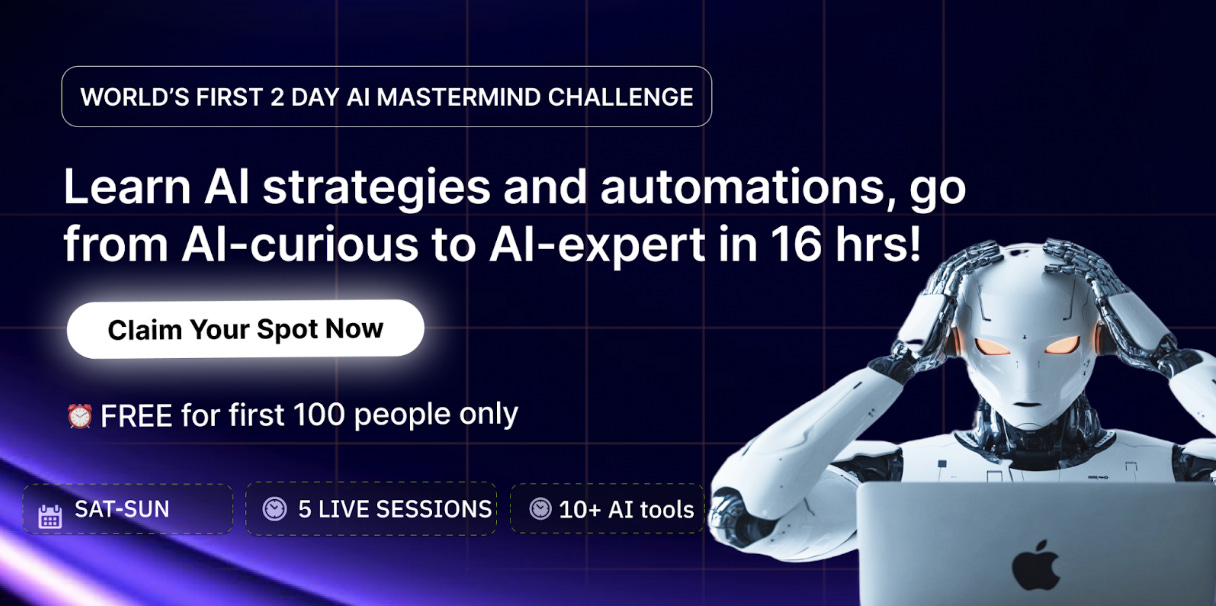Elon Musk: Betting It All on the Future
A curious child, he taught himself computer programming and sold his first video game at just 12 years old.
Elon Musk was born on 28 June 1971 in Pretoria, South Africa. A curious child, he taught himself computer programming and sold his first video game at just 12 years old. By the time he left South Africa for North America, he was determined to chase bigger opportunities (and bigger risks).
Before we continue, a quick word from today’s sponsor:
Your Exclusive Invite for the World’s first 2 day AI Challenge (usually $895, but $0 today)
51% of companies have started using AI
Tech giants have cut over 53,000 jobs in 2025 itself
And 40% of professionals fear that AI will take away their job.
But here’s the real picture — companies aren't simply eliminating roles, they're hiring people who are AI-skilled, understand AI, can use AI & even build with AI.
Join the online 2-Day LIVE AI Mastermind by Outskill - a hands-on bootcamp designed to make you an AI-powered professional in just 16 hours.
Usually $895, but for the next 48 hours you can get in for completely FREE!
In just 16 hours & 5 sessions, you will:
✅ Learn the basics of LLMs and how they work.
✅ Master prompt engineering for precise AI outputs.
✅ Build custom GPT bots and AI agents that save you 20+ hours weekly.
✅ Create high-quality images and videos for content, marketing, and branding.
✅ Automate tasks and turn your AI skills into a profitable career or business.
🧠Live sessions- Saturday and Sunday
🕜10 AM EST to 7PM EST
All by global experts from companies like Amazon, Microsoft, SamurAI and more. And it’s ALL. FOR. FREE. 🤯 🚀
🎁 You will also unlock $5100+ in AI bonuses: 💬 Slack community access, 🧰 top AI tools, and ⚙️ ready-to-use workflows — all free when you attend!
Join in now, (we have limited free seats! )
Musk studied physics and economics at the University of Pennsylvania, then briefly enrolled at Stanford before dropping out after just two days. The internet was exploding, and he did not want to waste a moment. In 1996, he co-founded Zip2, a digital business directory, which Compaq later acquired for $307 million.
Flush with cash, Musk moved on to online banking. He launched X.com in 1999, which would later merge with Confinity to become PayPal. When eBay bought PayPal in 2002 for $1.5 billion, Musk walked away with $180 million. Most would have retired then, but Musk was just getting started.
That same year, he founded SpaceX, pouring nearly all his fortune into building reusable rockets. His early launches failed spectacularly, nearly bankrupting him, but in 2008 SpaceX finally succeeded with Falcon 1, winning a NASA contract that kept the company alive.
Meanwhile, he joined Tesla Motors, a fledgling electric car company. Musk invested heavily, became CEO, and steered it through years of skepticism, production struggles, and financial near-collapse. Tesla’s success eventually transformed the global auto industry and made Musk the richest person in the world.
Musk did not stop there. He launched SolarCity, Neuralink, and The Boring Company. He rebranded Twitter as X, aiming to turn it into an “everything app.” His ventures, sometimes polarizing, always carry the same theme: betting on bold visions that others dismiss as impossible.
Risk Fuels Reinvention
Elon Musk could have coasted after PayPal, living comfortably off his $180 million payout. Instead, he doubled down. He poured nearly everything into SpaceX and Tesla, at one point funding payroll with personal loans while sleeping on friends’ couches. To many, this looked reckless. To Musk, it was necessary.
His approach shows that transformative ideas often require betting more than feels safe, and that playing it small rarely builds empires.
Musk’s willingness to risk stability for vision is why we now talk seriously about reusable rockets, mass-market electric cars, and even colonizing Mars.
The takeaway: is not that everyone should gamble everything, but that calculated risk, when guided by conviction, can multiply opportunity. Comfort preserves what exists. Risk, if taken wisely, creates what does not yet exist.
Until next time,
The Chronicler





